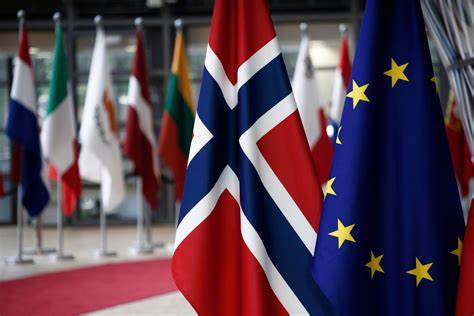
22/04/2024
NORWAY AND THE EU – SECURITY AND DEFENCE
NORWAY AND THE EU – SECURITY AND DEFENCE
Russia’s full-scale invasion of Ukraine just over two years ago has accelerated the defence and security policy transformation of the EU. Defence and security will become even more important in the new EU Commission that will take office from the autumn. Security has become a cross-cutting issue in the EU. A closer cooperation between Norway and the EU does not weaken NATO, as the Norwegian Foreign Minister has emphasized. Norway does not need another EU review to step up Norway’s security and defence cooperation with the EU. Norway will benefit from closer cooperation with our neighbours and European allies in the EU.
It may be surprising to some that the EEA Agreement could become increasingly important for Norwegian security. In the short term, it means rapidly enhancing military support to Ukraine. Through the EEA, Norway will participate in the EU program EDIRPA, which is currently under consideration in the Parliament, for joint procurement of military equipment. Norway also contributes through the EU program ASAP to the procurement of ammunition for Ukraine.
The EU’s focus on defence and security will be further strengthened in the years to come. We will be facing an EU that takes greater responsibility for European security and a Europe that develops and produces more high-tech and advanced equipment that can be used for both civilian and military purposes.
In addition to the many ad-hoc and temporary measures that have been put in place to support Ukraine, the EU Commission has proposed a new European program (EDIP) to enhance the European defence industry. Before Easter, EU leaders agreed on new, broader, and more long-term efforts to increase Europe’s production of defence materials and support the development of the European defence industry, as well as research and innovation. Uncertainty about the willingness and ability of the United States to contribute, regardless of who wins the presidential election in November, is also a concern in Brussels.
The ambitious proposals put forward by the EU Commission in March this year (EDIS, EDIP) go considerably further than what has been seen before. But plans must be followed by funding and action plans followed by action. There is uncertainty about future EU budgets. Our neighboring EU member countries, Sweden, Denmark, and Finland, have therefore supported proposals to open up for loans through the European Investment Bank (EIB) for new defence initiatives, including for so-called dual-use goods. This is also a clear invitation to private investors. France and several Eastern member states have proposed that the EU take out loans as it did in 2021 to finance the reconstruction fund established after COVID-19.
Like late year’s reports by the Government appointed Defence Commission and the Total Preparedness Committee the report by the EEA Commission, presented on April 11, emphasizes the importance of closer cooperation between Norway and the EU. Six of the seven members recommend that Norway “in addition to our participation in a strong NATO,” should now “step up our cooperation with the EU to ensure our security by further strengthening ties to our European allies and neighbours.” The commission emphasizes the serious security situation and is unanimous in recommending seeking closer cooperation with the EU on foreign policy, security, and defence.
This development will also require a change of pace for the Norwegian defence industry, with greater demands for adaptation and strategic thinking. It will be increasingly important to strengthen ties with European partners, with the EU Commission and the European Parliament, and to be present in Brussels to seize the market opportunities that arise through closer coordination through EU bodies.
EU countries are also collaborating to become more resilient against complex, so-called “hybrid” threats, protecting critical infrastructure such as pipelines and cables at sea and cybersecurity for digital services, as well as combating fake news and influence operations. New EU research and development programs might therefore in the future be directed towards addressing external threats, such as climate, health, hybrid, and military threats.
It also involves protection against what the EU calls “economic coercion,” i.e., how to jointly handle and minimize politically motivated coercive measures that affect the economies of EU countries. This will also be important for Norway, so that we do not once again end up in the Chinese “freezer” or that our fishing exports are affected by unfair and unjustified bans or restrictions. However, it may become more challenging to safeguard Norwegian interests when trade policy is, in principle, to be kept out of the EEA Agreement, and Norway is not part of the EU’s customs union.
The EU’s goal is greater strategic authonomy in vulnerable value chains. New requirements can directly impact the bottom line for Norwegian businesses. Uncertainty increases when it is unclear whether new rules will become part of Norwegian law through the EEA. Norway’s self-harm by being excluded from the EU fora that discuss and decide on defence, civil protection, and emergency preparedness should be well known. The Norwegian government should clarify how Norwegian interests can best be safeguarded, whether through the EEA or new agreements.
